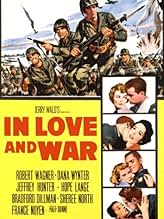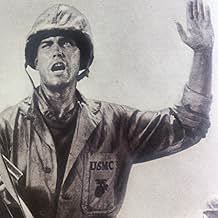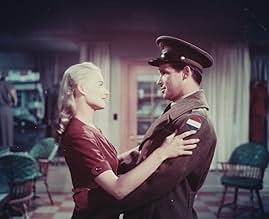In 1944, the family lives of three San Francisco Marines are affected by their personal experiences on the front lines in the Pacific and at home.In 1944, the family lives of three San Francisco Marines are affected by their personal experiences on the front lines in the Pacific and at home.In 1944, the family lives of three San Francisco Marines are affected by their personal experiences on the front lines in the Pacific and at home.
- Awards
- 1 win total
Edit Angold
- Maid
- (uncredited)
Edith Barrett
- Mrs. Lenaine
- (uncredited)
James Bell
- Sidney Lenaine
- (uncredited)
Barry Bernard
- Hotel Clerk
- (uncredited)
Barry Brown
- Minor Role
- (uncredited)
- Director
- Writers
- All cast & crew
- Production, box office & more at IMDbPro
Featured reviews
The story follows three marines, and their girls, from home leave to combat in the Pacific.
The movie's very much a mixed package. With a couple exceptions, war films of the 1950's shied away from combat realism, whose trauma might easily overwhelm audiences. The second half of this war film does a pretty good job portraying the so-called fog of war, along with perfectly natural emotional and physical reactions to combat death. These scenes are done on exterior sets and are uglified to maximal extent. Such grim scenes are then intercut with sunny scenes in San Francisco, done in glowing candy box colors. The resulting contrast is appropriately jolting, to say the least, and leaves no doubt that between "love" and "war", which is to be preferred.
The trouble lies with a swollen narrative that is too conventional in the "Love" part. It also shows what happens when a big studio, TCF, decides to promote a younger cast into possible stardom. Everybody—about the top seven in the cast list—gets cameo screen time, in the film's first half, especially. This draws out the runtime, and coupled with a conventional script, tends to drag out the first part, long after we've gotten the idea. The actors perform well enough, though O'Neill's (Wagner) drunken binge is over the top, maybe the only time in the actor's generally restrained career. Note, in passing, the post-war symbolism of pairing Newcombe (Dillman) with Kalai (Nuyen).
All in all, the movie's a good look at how Hollywood shaped WWII to commercial needs of the big screen. But is otherwise forgettable.
The movie's very much a mixed package. With a couple exceptions, war films of the 1950's shied away from combat realism, whose trauma might easily overwhelm audiences. The second half of this war film does a pretty good job portraying the so-called fog of war, along with perfectly natural emotional and physical reactions to combat death. These scenes are done on exterior sets and are uglified to maximal extent. Such grim scenes are then intercut with sunny scenes in San Francisco, done in glowing candy box colors. The resulting contrast is appropriately jolting, to say the least, and leaves no doubt that between "love" and "war", which is to be preferred.
The trouble lies with a swollen narrative that is too conventional in the "Love" part. It also shows what happens when a big studio, TCF, decides to promote a younger cast into possible stardom. Everybody—about the top seven in the cast list—gets cameo screen time, in the film's first half, especially. This draws out the runtime, and coupled with a conventional script, tends to drag out the first part, long after we've gotten the idea. The actors perform well enough, though O'Neill's (Wagner) drunken binge is over the top, maybe the only time in the actor's generally restrained career. Note, in passing, the post-war symbolism of pairing Newcombe (Dillman) with Kalai (Nuyen).
All in all, the movie's a good look at how Hollywood shaped WWII to commercial needs of the big screen. But is otherwise forgettable.
About half of the film is all about relationships between three marines and their sweethearts, three very different characters of very different backgrounds, and so are their sweethearts. The second half is dominated by the war in the Pacific, greatly depicting the arduous hardships of the marines and their unimaginable heroic efforts and deeds. You get a very extensive and clear picture of what the war in the Pacific really was like. The three girls encounter the ordinary fates of female civil victims of the war, one is widowed with a child, another sinks down in alcohol and tragedy, and no one gets out of it unscathed, although there is always a continuity. It is beautifully photographed and filmed, and Hugo Friedhofer's music adds to its high quality. This is a film you would like to see again sometime.
There are many familiar faces in this one, from their younger days: Robert Wagner, Bradford Dillman, Jeffrey Hunter, Hope Lange, Dana Wynter and Sheree North. They're all affected by the war, as well as their own personal lives, which aren't always a pretty picture. There are some realistic battle scenes, as well as family conflict, alcoholism, love vs. Duty, as three servicemen, their families, and the women in their lives all interconnect.
Some scenes stay with you, like the enemy tank relentlessly forging ahead that needed to be destroyed, the enemy soldier begging for a drink of water, the self-destructive socialite whose wild ways caught up with her, and an adorable little boy who'll never see his father. There's drama without the melodrama.
Worth checking out!
Some scenes stay with you, like the enemy tank relentlessly forging ahead that needed to be destroyed, the enemy soldier begging for a drink of water, the self-destructive socialite whose wild ways caught up with her, and an adorable little boy who'll never see his father. There's drama without the melodrama.
Worth checking out!
10paforten
I grew up during the years of WWII and always enjoy movies made about that time. This movie is exceptionally great. TCM (Turner Classic Movies) shows it now and then. I like the choice of actors/actresses for the parts. Robert Wagner, Bradford Dillman, Jeffrey Hunter and Hope Lang are especially great. I like the scenes of early San Francisco shown in the film. I also think it's a great character study, most of the men in the U.S. felt it was their duty to enlist in the military to avenge our country. The struggle is show in the character of Alan Newcome (Bradford Dillman). And also the expectations put on Alan by his father. Then there is the internal struggle of "Frankie" (Robert Wagner) to measure up to the character of the men he is serving with. Then comes the noble gesture by Jeffrey Hunter's character to "do the right thing," and marry his pregnant girlfriend. I can't seem to find the right words to talk about this great movie, it's so exceptional. See it yourself, I think you'll like the life lessons it has.
Although made in 1958, this is one of those patriotic WWII movies that are a hit with Americans who appreciate the sacrifices made for our freedom. Yet, there was plenty of home front footage as well with very good acting. Dana Wynter, whom I had just seen in Sink The Bismarck, did a wonderful job in a difficult part. The writing for the part was superficial and the reasoning behind it not believable. And yet, Ms. Wynter took it and made it believable. What an actress! And darn good looking too! The male leads were all well done, Jeffrey Hunter, Robert Wagner and Bradford Dillman. One finds oneself rooting for all three Marines to make it through the battle scenes. Hope Lange, a great actress as always and a real beauty. Remember her in the TV version of The Ghost and Mrs. Muir? France Nuyen, a sweet face and good acting, what more could we want? One face popped up that I recognized right away - a Corcoran boy! This one is Brian who played Israel Boone on the old Daniel Boone TV show. But it was his brother Kevin Corcoran whom I thought about - the great child actor who did Old Yeller, Pollyanna and others. His sister in the movie is Veronica Cartwright, the real life sister of Angela Cartwright of the Danny Thomas show, Lost in Space and Brigitta in the Sound of Music movie. Of course Veronica made news herself as Jimima Boone on the same TV show as Brian, Lumpy's sister on Leave It To Beaver, Spencer's Mountain and other good parts. All in all, excellent acting in this movie, good drama and exciting WWII action by the Marines. Well worth seeing.
Did you know
- TriviaFilm debut of Veronica Cartwright.
- GoofsAlthough the film is set during the final days of World War II, which ended in 1945, outside the San Francisco hotel where Jeffrey Hunter and Hope Lange spend their honeymoon are parked, among other vehicles, a 1954 Ford and a 1952 Plymouth; CinemaScope panoramas of San Francisco streets, and the San Francisco skyline are all contemporary 1958 views.
- ConnectionsReferenced in What's My Line?: Robert Wagner (2) (1958)
- How long is In Love and War?Powered by Alexa
Details
- Release date
- Country of origin
- Language
- Also known as
- The Big War
- Filming locations
- Production companies
- See more company credits at IMDbPro
Box office
- Budget
- $1,590,000 (estimated)
- Runtime1 hour 51 minutes
- Aspect ratio
- 2.35 : 1
Contribute to this page
Suggest an edit or add missing content

























